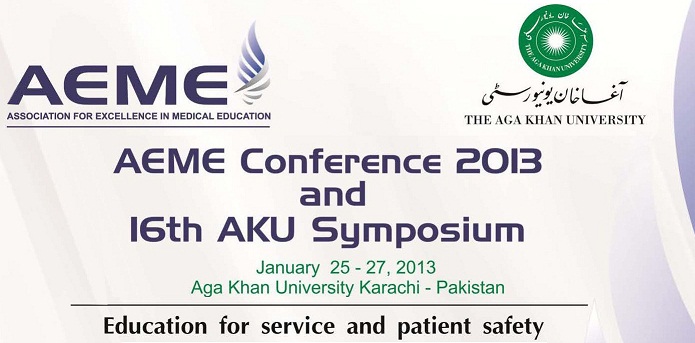Day 1 : Poster Presentations (Theme: Curricular Innovations)
Humanities in the medical curriculum
Location
Auditorium Pond Side
Start Date
26-1-2013 10:30 AM
Abstract
Background: The importance of humanities and social sciences in the development of empathetic and effective physicians has been documented in the literature. At AKU, Pakistan Studies and Islamic Studies have been mandatory components of the medical curriculum as per Pakistan Medical and Dental Council (PMDC) requirements since the inception of the college. The Humanities and Social Sciences (HASS) program in the medical curriculum was introduced in 2008. It has evolved from being limited to Pakistan and Islamic Studies to including electives in foreign languages, literature, sociology, film, music, fine arts, photography etc. The main two strands of Pakistan Studies and Islamic Studies continue, but with emphasis on critical appraisal of history and respect for all religions of Pakistan.
Methods: This study is a review of the history and evolution of HASS at AKU and the associated opportunities and challenges that allowed for the development of HASS as it is today using the following methodology: 1. Review of documents relevant to the shaping of HASS. 2. Key interviews of faculty members and senior leadership involved in the policy-level discourse that paved the way for introduction of a broader HASS curriculum in the Medical College at AKU.
Results: The study is currently in progress, but anecdotal and preliminary evidence reveals institutional recognition of the importance of humanities education in the medical curriculum.
Conclusions: The experience of HASS academic team in the evolution and development of the current HASS program in the medical college at AKU will be shared. The importance of humanities and social sciences in the medical curriculum will be discussed in light of WHO’s focus on social determinants of health, and social accountability of medical education.
Key words: Humanities, Social Sciences, Curricular enhancement
Humanities in the medical curriculum
Auditorium Pond Side
Background: The importance of humanities and social sciences in the development of empathetic and effective physicians has been documented in the literature. At AKU, Pakistan Studies and Islamic Studies have been mandatory components of the medical curriculum as per Pakistan Medical and Dental Council (PMDC) requirements since the inception of the college. The Humanities and Social Sciences (HASS) program in the medical curriculum was introduced in 2008. It has evolved from being limited to Pakistan and Islamic Studies to including electives in foreign languages, literature, sociology, film, music, fine arts, photography etc. The main two strands of Pakistan Studies and Islamic Studies continue, but with emphasis on critical appraisal of history and respect for all religions of Pakistan.
Methods: This study is a review of the history and evolution of HASS at AKU and the associated opportunities and challenges that allowed for the development of HASS as it is today using the following methodology: 1. Review of documents relevant to the shaping of HASS. 2. Key interviews of faculty members and senior leadership involved in the policy-level discourse that paved the way for introduction of a broader HASS curriculum in the Medical College at AKU.
Results: The study is currently in progress, but anecdotal and preliminary evidence reveals institutional recognition of the importance of humanities education in the medical curriculum.
Conclusions: The experience of HASS academic team in the evolution and development of the current HASS program in the medical college at AKU will be shared. The importance of humanities and social sciences in the medical curriculum will be discussed in light of WHO’s focus on social determinants of health, and social accountability of medical education.
Key words: Humanities, Social Sciences, Curricular enhancement


